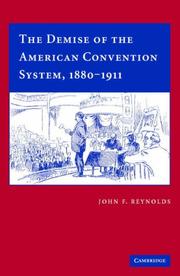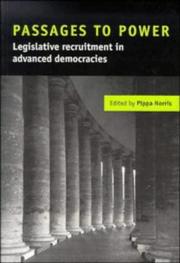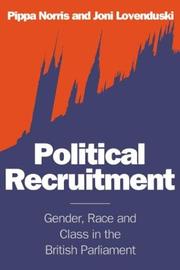| Listing 1 - 5 of 5 |
Sort by
|

ISBN: 9780511511684 9780521859639 9781107404854 0511250029 9780511250026 9780511250538 0511250533 051151168X 9786610703555 6610703558 0521859638 1107167450 1280703555 0511248962 0511319215 0511249519 1107404851 Year: 2006 Publisher: Cambridge ; New York : Cambridge University Press,
Abstract | Keywords | Export | Availability | Bookmark
 Loading...
Loading...Choose an application
- Reference Manager
- EndNote
- RefWorks (Direct export to RefWorks)
During the nineteenth century American political parties selected their candidates for elective offices in conventions. Around 1910 most states established a system of direct primaries whereby the voters selected their parties' nominees for public office. This book, first published in 2006, examines the transition from the indirect to the direct primary, as well as its implications for American politics. It offers a systematic analysis of the convention system in four states (New Jersey, Michigan, Colorado and California) and the legislative history of the regulation of political parties during the Progressive Era. It argues that the major political parties themselves were chiefly responsible for doing away with the nominating convention. Candidates played a pivotal role in inaugurating the new nominating system as they became more open and aggressive in pursuit of their parties' nominations. The convention system was never designed to withstand the pressures exerted on it by a more competitive nominating process.
Political conventions --- Nominations for office --- Political parties --- Office, Nominations for --- Office, Qualifications for --- Qualifications for office --- Election law --- Elections --- Politics, Practical --- Representative government and representation --- Primaries --- History. --- Arts and Humanities --- History
Book
ISBN: 9788021077966 8021077964 9788021062139 8021062134 Year: 2013 Publisher: Brno, [Czech Republic] : Masarykova univerzita, Fakulta sociálních studií, Mezinárodní politologický ústav,
Abstract | Keywords | Export | Availability | Bookmark
 Loading...
Loading...Choose an application
- Reference Manager
- EndNote
- RefWorks (Direct export to RefWorks)
The selection of candidates is one of the most important processes related to elections which are the key aspect of the functioning of modern democracies. The shape and the outcomes of nomination processes reveal how political parties operate within their organizations. The process of candidate selection also affects the real politics as the political elite is formed from the group of elected candidates. For these reasons, this topic is slowly gaining significance in political science. The book follows these trends and focuses on the nomination processes in the Czech political parties for elections to the Chamber of Deputies in 2010. Its aim is not only to map and analyse the Czech case, but also to contribute to the theoretical debate about how to study the selection of candidates in a broader sense.
Nominations for office --- Political parties --- Political candidates --- Office, Nominations for --- Office, Qualifications for --- Qualifications for office --- Election law --- Elections --- Politics, Practical --- Representative government and representation --- Political conventions --- Primaries --- Candidates, Political --- Nominees, Political --- Political nominees --- Politicians --- Parties, Political --- Party systems, Political --- Political party systems --- Political science --- Divided government --- Intra-party disagreements (Political parties) --- Czech Republic. --- Elections, 2010.
Book
ISBN: 0803981244 9780803981249 Year: 1988 Volume: 18 Publisher: London: Sage,
Abstract | Keywords | Export | Availability | Bookmark
 Loading...
Loading...Choose an application
- Reference Manager
- EndNote
- RefWorks (Direct export to RefWorks)
Political parties --- Nominations for office --- Comparative government --- Nominations for office. --- Comparative government. --- 324.074.134 <493> <082.2> --- #SBIB:324H41 --- #SBIB:324H45 --- Comparative political systems --- Comparative politics --- Government, Comparative --- Political systems, Comparative --- Political science --- Office, Nominations for --- Office, Qualifications for --- Qualifications for office --- Election law --- Elections --- Politics, Practical --- Representative government and representation --- Political conventions --- Primaries --- Verkiezingskandidatuur. Verkiezingsprogramma's. Verkiezingscampagnes. Kiesstrijd. Verkiezingskosten. Verkiezingsuitslagen niveau land, natie--België--Bloemlezingen. Readers. Citaten --- Politieke structuren: elite --- Politieke sociologie: stratificatie en machtshiërarchie --- 324.074.134 <493> <082.2> Verkiezingskandidatuur. Verkiezingsprogramma's. Verkiezingscampagnes. Kiesstrijd. Verkiezingskosten. Verkiezingsuitslagen niveau land, natie--België--Bloemlezingen. Readers. Citaten --- Candidats aux élections --- Etudes comparatives --- Candidats aux élections

ISBN: 052159099X 0521599083 9780521599085 9780521590990 Year: 1997 Publisher: Cambridge: Cambridge university press,
Abstract | Keywords | Export | Availability | Bookmark
 Loading...
Loading...Choose an application
- Reference Manager
- EndNote
- RefWorks (Direct export to RefWorks)
Nominations for office --- Political parties. --- Legislators --- Comparative government --- Democracy. --- Investiture des candidats --- Partis politiques --- Institutions politiques comparées --- Démocratie --- Recruiting --- Political parties --- Democracy --- Representative government and representation --- #SBIB:324H41 --- #SBIB:AANKOOP --- #A9804A --- Politieke structuren: elite --- Comparative government. --- Legislators. --- Nominations for office. --- Representative government and representation. --- Recruiting. --- Institutions politiques comparées --- Démocratie --- Parliamentary government --- Political representation --- Representation --- Self-government --- Constitutional history --- Constitutional law --- Political science --- Elections --- Republics --- Suffrage --- Parties, Political --- Party systems, Political --- Political party systems --- Divided government --- Intra-party disagreements (Political parties) --- Political conventions --- Office, Nominations for --- Office, Qualifications for --- Qualifications for office --- Election law --- Politics, Practical --- Primaries --- Lawmakers --- Legislatures, Members of --- Members of legislatures --- Members of parliaments --- Parliaments, Members of --- Statesmen --- Equality --- Comparative political systems --- Comparative politics --- Government, Comparative --- Political systems, Comparative --- Legislators - Recruiting

ISBN: 0521465583 0521469619 0511598602 9780521465588 9780521469616 9780511598609 Year: 1995 Publisher: Cambridge [England]: Cambridge university press,
Abstract | Keywords | Export | Availability | Bookmark
 Loading...
Loading...Choose an application
- Reference Manager
- EndNote
- RefWorks (Direct export to RefWorks)
In this compelling book Pippa Norris and Joni Lovenduski provide the first full account of legislative recruitment in Britain for twenty-five years. Their central concern is how and why some politicians succeed in moving into the highest offices of state, while others fail. The book examines the relative dearth of women, black and working-class Members of Parliament, and whether the evident social bias in the British political élite matters for political representation. Legislative recruitment concerns the critical step from lower levels (activists, local counsellors) to a parliamentary career. The authors draw evidence from the first systematic surveys of parliamentary candidates, Members of Parliament and party selectors, as well as detailed personal interviews. The study explores how and why people become politicians, and the consequences for parties, legislatures and representative government.
Legislators --- Nominations for office --- Women legislators --- Minorities --- Representative government and representation --- Recruiting --- Political activity --- 324.001.5 --- -Nominations for office --- -Representative government and representation --- -Women legislators --- -#SBIB:324H42 --- #SBIB:324H41 --- #SBIB:324H30 --- 324.001.5 <41> --- 328.187 <41> --- Congresswomen --- Parliamentary government --- Political representation --- Representation --- Self-government --- Constitutional history --- Constitutional law --- Political science --- Democracy --- Elections --- Republics --- Suffrage --- Office, Nominations for --- Office, Qualifications for --- Qualifications for office --- Election law --- Politics, Practical --- Political conventions --- Primaries --- Ethnic minorities --- Foreign population --- Minority groups --- Persons --- Assimilation (Sociology) --- Discrimination --- Ethnic relations --- Majorities --- Plebiscite --- Race relations --- Segregation --- Lawmakers --- Legislatures, Members of --- Members of legislatures --- Members of parliaments --- Parliaments, Members of --- Statesmen --- Verkiezingsonderzoek --(algemeen) --- -Political activity --- Politieke structuren: verkiezingen --- Politieke structuren: elite --- Politieke cultuur --- Great Britain. Parliament --- -Elections --- 324.001.5 Verkiezingsonderzoek --(algemeen) --- #SBIB:324H42 --- Great Britain. --- 英國. --- England and Wales. --- Elections. --- Social Sciences --- Political Science --- Legislators - Recruiting - Great Britain --- Nominations for office - Great Britain --- Women legislators - Great Britain --- Minorities - Great Britain - Political activity --- Representative government and representation - Great Britain
| Listing 1 - 5 of 5 |
Sort by
|

 Search
Search Feedback
Feedback About UniCat
About UniCat  Help
Help News
News